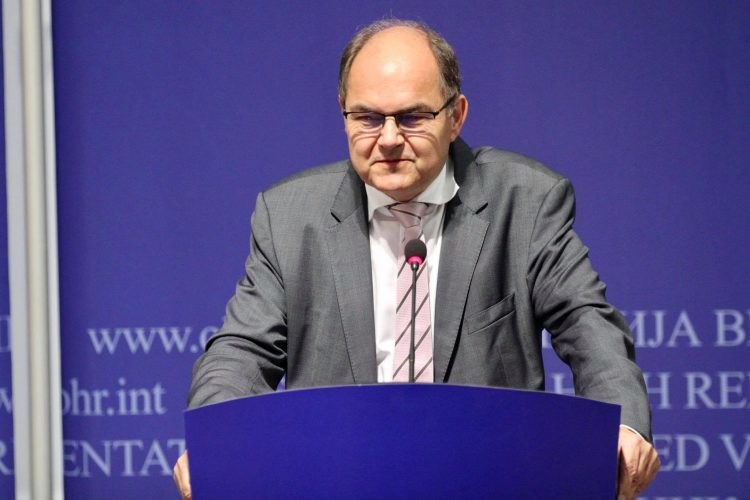
Bosnia’s international administrator, Christian Schmidt, did not take sides when he spoke about the need for election reform in BiH at a recent conference in Germany, but “described different views” on the issue in the country, the Office of the High Representative (OHR) said on Wednesday.
The OHR statement came after a meeting between the Croat member of Bosnia’s tripartite Presidency and its current Chairman, Zeljko Komsic, and EU ambassadors in BiH on Wednesday.
Komsic told the media after the meeting that Bosnia’s ambassador in Germany was sent to the office of German Chancellor, Angela Merkel, to ask “whether the statement of Christian Schmidt represents a change in the policy of Germany compared to the statement the government made on May 6 this year.”
Schmidt’s statements, which Komsic was referring to, were from a recent press conference in Germany regarding Bosnia’s Electoral Law and the proposed amendments.
“Mr. (Zeljko) Komsic is the Croat representative in the state presidency, but he was elected more by Bosniaks than by Croats. How complicated the system is can also be seen by the fact that the representative of the Croats (Dragan) Covic lost in the confrontation with Komsic,” Schmidt said at that meeting.
According to Komsic, this statement is contrary to an earlier document of Germany’s Foreign Affairs Ministry, which said that “the German government is of the opinion that the principle of ‘legitimate representation’ discussed in the context of electoral reform could further deepen the division of BiH and complicate the implementation of relevant court rulings.”
After meeting with EU Ambassadors on Wednesday, Komsic said that Germany is not changing its policy towards BiH as described in the May 6 document, regardless of the statements Schmidt made recently.
The OHR told N1 that on Sunday, September 5, the High Representative participated in the Conference of the German Atlantic Society, which aimed to inform participants about the special characteristics of the BiH political and electoral system in order to gain support for the country.
“The High Representative spoke about the situation and described different views, noting that current talks on electoral law reform are difficult. He did not take anyone's side, and suggested that we work together to start talks on the law or changes to the law in time, before the 2022 elections,” the statement said.
“The High Representative calls on the BiH legislature to implement the recommendations of the ODIHR / GRECO and the Venice Commission and to present a package of electoral reforms that is in line with the democratic principles and decisions of the European Court of Human Rights and the BiH Constitutional Court's election-related decisions. Every law should respect the principles of the General Framework Agreement for Peace,” the OHR said.







Kakvo je tvoje mišljenje o ovome?
Budi prvi koji će ostaviti komentar!